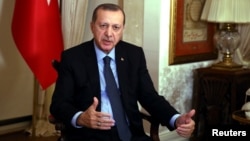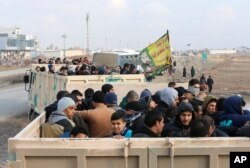The U.S. Embassy in Ankara in a strongly worded statement Wednesday denied claims by Turkish President Recep Tayyip Erdogan that there is “confirmed evidence” showing U.S.-led coalition forces have given support to Islamic State.
“The United States government is not supporting Daesh,” the embassy said, using an Arabic acronym for the Islamic State (IS) group.
The United States “did not create or support Daesh in the past. Assertions the United States government is supporting Daesh are not true,” the statement said.
Erdogan on Tuesday accused the U.S.-led coalition of not only backing IS but also Kurdish rebel factions operating inside and outside of Turkey.
“They were accusing us of supporting Daesh,” Erdogan said. “Now they give support to terrorist groups including Daesh" and Kurdish rebel groups.
“It's very clear," he said. "We have confirmed evidence, with pictures, photos and videos.”
‘Considerable misinformation’
The U.S. embassy, while not mentioning Erdogan by name, said there is “considerable misinformation circulating in Turkish media” about U.S.-led involvement against IS in Syria.
Turkey has long been critical of the U.S. support in Syria of Kurdish forces who are part of the U.S-led coalition fighting IS. Ankara accuses those forces of helping Kurdish insurgents inside Turkey who have been battling government forces for more than 30 years.
The Kurdish militia in Syria, known as YPG, is designated as a terror group in Turkey. Ankara said the group helps the outlawed Kurdistan Workers' Party (PKK) in Turkey, which is designated by the U.S. as a terror group.
In its statement, the U.S. Embassy said American forces do not arm the Kurdish factions.
“The United States government has not provided weapons or explosives to the YPG or the PKK period,” the embassy said.
A U.S. official on Tuesday called Erdogan's comments “just ludicrous.”
“I don't know where that comes from,” State Department spokesman Mark Toner told reporters in Washington.
Burak Bekdil, a Turkish defense analyst, told VOA that Erdogan's comments are “playing to a domestic audience. … It is for internal consumption.”
Absurd accusation
Alan Makovsky, a former U.S. State Department official and a Turkey expert, told VOA that Erdogan's accusation is absurd.
“If it's not, he owes it to the world to show his evidence,” Makovsky said.
Erdogan has come under blistering domestic criticism for months over Ankara's handling of IS.
In recent months, Syrian rebels supported by Turkish forces have been fighting in northern Syria as part of Turkey's “Euphrates Shield” operation, which is aimed at driving both IS and Kurdish fighters from the Turkey-Syrian border.
Soner Cagaptay, director of the Turkish Research Program at The Washington Institute, told VOA that Turkish-backed forces are facing strong resistance from IS in Syria. A video released by IS last week purportedly showed two Turkish soldiers being burned alive.
“It seems to me that Turkey is using reverse psychology against the U.S, blaming Washington for supporting IS, hoping this will convince America come to Turkey's assistance,” Cagaptay said.
But, he added, that it is “probably one of the worst strategies” to get U.S. help.
Turkish security forces arrested more than 1,300 people in 2016 for suspected links to the IS, Turkey's Interior Ministry said in a statement on Wednesday. More than 670 of them were foreign nationals, it added.





